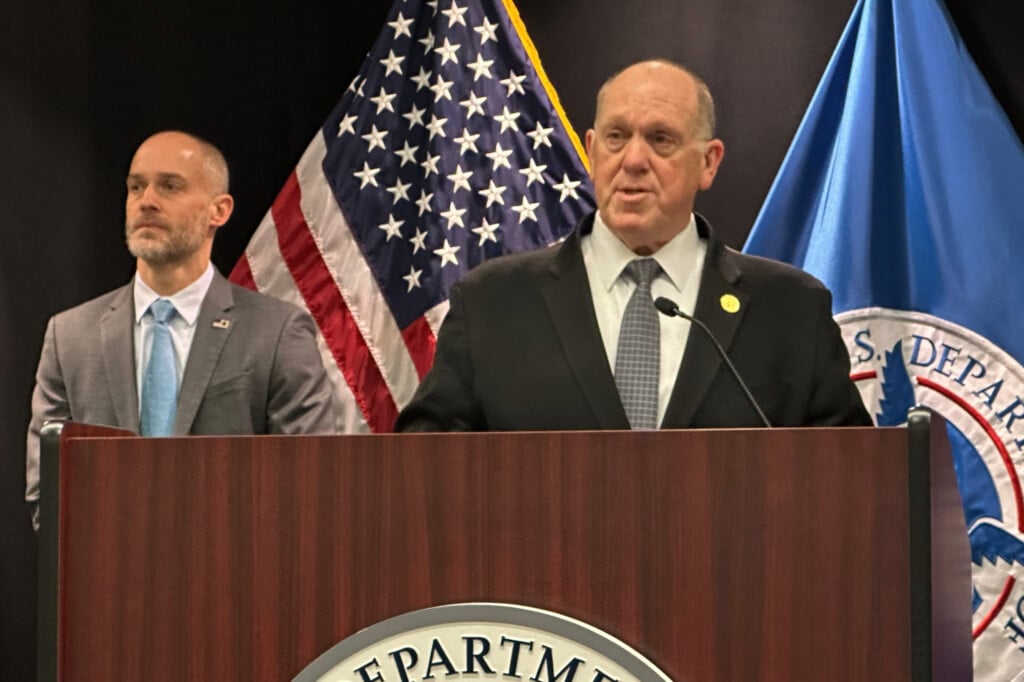U.S. Rep. Kevin McCarthy Elected House Speaker in 15th Vote

Rep. Kevin McCarthy, R-Calif., smiles after winning the 15th vote in the House chamber as the House enters the fifth day trying to elect a speaker and convene the 118th Congress in Washington, early Saturday, Jan. 7, 2023. (AP Photo/Alex Brandon)
U.S. Rep. Kevin McCarthy (R-California) was elected House speaker on a historic post-midnight 15th ballot early Saturday, overcoming holdouts from his own ranks and floor tensions boiling over, which involved Alabama Congressman Mike Rogers.
The tally for the 15th vote was 216-212. This had been a chaotic week that tested the new GOP House majority’s ability to govern.
After four days of grueling ballots, McCarthy flipped more than a dozen conservative holdouts to become supporters, including the chairman of the chamber’s Freedom Caucus, leaving him just a few shy of seizing the gavel for the new Congress. Earlier, as the House resumed for the late night session, McCarthy had been on the cusp of victory in the 14th round but he fell one vote short.
He strode to the back of the chamber to confront Matt Gaetz, sitting with Lauren Boebert and other holdouts. Fingers were pointed, words exchanged and violence apparently just averted.
At one point, Rep. Mike Rogers started to charge toward Gaetz before another Republican, Richard Hudson, physically pulled him back.
“Stay civil!” someone shouted.
Gaetz had voted “present” at the last minute, and McCarthy needed his vote. Gaetz’s vote angered Rogers.

Rep. Richard Hudson, R-N.C., left, pulls Rep. Mike Rogers, R-Ala., back as they talk with Rep. Matt Gaetz, R-Fla., and others during the 14th round of voting for speaker as the House meets for the fourth day to try and elect a speaker and convene the 118th Congress in Washington, Friday, Jan. 6, 2023. At right is Rep. Patrick McHenry, R-N.C. (AP Photo/Andrew Harnik)
Republicans quickly moved to adjourn, but then McCarthy rushed forward to switch his vote to remain in session as colleagues chanted “One more time!”
The few Republican holdouts began voting present as well, dropping the tally he needed to finally seize the gavel in what was heading toward a dramatic finish on the fourth long day of a grueling standoff that has shown the strengths and fragility American democracy.
The day’s stunning turn of events came after McCarthy agreed to many of the detractors’ demands — including the reinstatement of a longstanding House rule that would allow any single member to call a vote to oust him from office.
McCarthy will emerge as a weakened speaker, having given away some powers and constantly under the threat of being booted by his detractors. But he could also be emboldened as a survivor of one of the more brutal fights for the gavel in U.S. history. Not since the Civil War era has a speaker’s vote dragged through so many rounds of voting.
The showdown that has stymied the new Congress came against the backdrop of the second anniversary of the Jan. 6, 2021, attack on the Capitol, which shook the country when a mob of then-President Donald Trump’s supporters tried to stop Congress from certifying the Republican’s 2020 election defeat to Democrat Joe Biden.
One significant former holdout, Republican Scott Perry, chairman of the conservative Freedom Caucus who had been a leader of Trump’s efforts to challenge the 2020 election, tweeted after his switched vote for McCarthy: “We’re at a turning point.”
Another Republican holdout, Byron Donalds of Florida, who was repeatedly nominated as an alternative candidate for speaker, switched on Friday, too, voting for McCarthy.
Trump may have played a role in swaying the holdouts. Donalds said he had spoken to the former president who had been urging Republicans to wrap up their public dispute the day before.
As Rep. Mike Garcia nominated McCarthy for Friday, he also thanked the U.S. Capitol Police who were given a standing ovation for protecting lawmakers and the legislative seat of democracy on Jan. 6.
Electing a speaker is normally an easy, joyous task for a party that has just won majority control. But not this time: About 200 Republicans had been stymied by 20 far-right colleagues who said McCarthy was not conservative enough.
The disorganized start to the new Congress pointed to difficulties ahead with Republicans now in control of the House, much the way that some past Republican speakers, including John Boehner, had trouble leading a rebellious right flank. The result: government shutdowns, standoffs and Boehner’s early retirement when conservatives threatened to oust him.
The agreement McCarthy presented to the holdouts from the Freedom Caucus and others centers around rules changes they have been seeking for months. Those changes would shrink the power of the speaker’s office and give rank-and-file lawmakers more influence in drafting and passing legislation.
At the core of the emerging deal is the reinstatement of a House rule that would allow a single lawmaker to make a motion to “vacate the chair,” essentially calling a vote to oust the speaker. McCarthy had resisted allowing a return to the longstanding rule that former Speaker Nancy Pelosi had done away with, because it had been held over the head of past Republican Speaker Boehner. But it appears McCarthy had no other choice.
Other wins for the holdouts are more obscure and include provisions in the proposed deal to expand the number of seats available on the House Rules Committee, to mandate 72 hours for bills to be posted before votes and to promise to try for a constitutional amendment that would impose federal limits on the number of terms a person could serve in the House and Senate.
The longest fight for the gavel started in late 1855 and dragged on for two months, with 133 ballots, during debates over slavery in the run-up to the Civil War.
(Copyright 2022 The Associated Press contributed to this report. All rights reserved. This material may not be published, broadcast, rewritten or redistributed without permission.)






